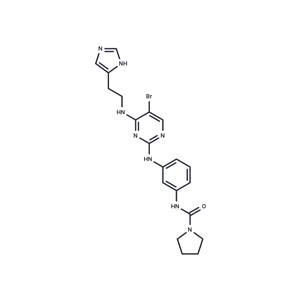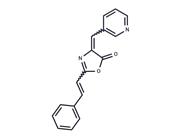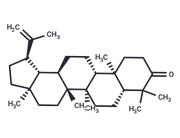| Name | BX-912 |
| Description | BX-912 is a specific inhibitor of 3-Phosphoinositide-dependent Kinase-1 (PDK1, IC50: 12 nM). The selectivity of BX-912 is more 10 fold than C-Kit, EGFR, PKA, PKC etc. |
| Cell Research | Cells such as MDA-468, MDA-453 are seeded at a low density (1.5-3 × 103 cells/well, 0.1 mL/well, 96-well plates) and are incubated overnight. BX912 treatments are made by adding 10 μL/well of the compound in 1% dimethyl sulfoxide and growth medium (final concentration of dimethyl sulfoxide, 0.1%), followed by brief shaking. Treated cells are incubated for 72 hours, and viability is measured by the addition of 10 μL of the metabolic dye WST-1. The WST-1 signal is read in a plate reader at 450 nm, and a no cell, or zero time cell, background is subtracted to calculate the net signal. (Only for Reference) |
| Kinase Assay | Kinase assays: PDK1 is assayed in a direct kinase assay and a coupled assay format measuring PDK1- and PtdIns-3,4-P2-mediated activation of AKT2. For the coupled assay, the final assay mixture (60 μL) contained: 15 mM MOPS, pH 7.2, 1 mg/mL bovine serum albumin, 18 mM β-glycerol phosphate, 0.7 mM dithiothreitol, 3 mM EGTA, 10 mM MgOAc, 7.5 μM ATP, 0.2 μCi of [γ- 33P]ATP, 7.5 μM biotinylated peptide substrate (biotin-ARRRDGGGAQPFRPRAATF), 0.5 μL of PtdIns-3,4-P2-containing phospholipid vesicles, 60 pg of purified recombinant human PDK1, and 172 ng of purified recombinant human AKT2. After incubation for 2 hours at room temperature, the biotin-labeled peptide is captured from 10 μL of the assay mixture on streptavidin-coated SPA beads, and product formation is measured by scintillation proximity in a Wallac MicroBeta counter. The product formed is proportional to the time of incubation and to the amount of PDK1 and inactive AKT2 added. PDK1 is added at suboptimal levels so that the assay could sensitively detect inhibitors of AKT2 activation as well as direct inhibitor BX912 of PDK1 or AKT2. To measure PDK1 activity directly, the final assay mixture (60 μL) contained 50 mM Tris-HCl, pH 7.5, 0.1 mM EGTA, 0.1 mM EDTA, 0.1% β-mercaptoethanol, 1 mg/mL bovine serum albumin, 10 mM MgOAc, 10 μM ATP, 0.2 μCi of [γ-33P]ATP, 7.5 μM substrate peptide (H2N-ARRRGVTTKTFCGT), and 60 ng of purified recombinant human PDK1. After 4 hours at room temperature, 25 mM EDTA is added and a portion of the reaction mixture on P81 phosphocellulose paper is spotted. The filter paper is washed three times with 0.75% phosphoric acid and once with acetone. After drying, the filter-bound labeled peptide is quantified using a phosphorimager. |
| In vitro | BX-912 exhibits inhibitory effects on ChcK1 (IC50: 0.83 μM), PKA (IC50: 0.11 μM), c-kit (IC50: 0.85 μM), and KDR (IC50: 0.41 μM). In tumor cells, BX-912 blocks the PDK1/Akt signaling pathway, inhibiting adhesion-dependent growth in various tumor cells (e.g., PC-3 cells) or inducing apoptosis. The compound shows a 30-fold higher sensitivity to growth inhibition by BX-912 in cancer cell lines with elevated Akt activity in soft agar than in tissue culture plastics, consistent with the cell survival function of the PDK1/Akt signaling pathway, especially significant for non-adherent cells. BX-912 significantly inhibits PDK1 enzyme activity without affecting AKT2 activity (IC50 >10 μM), making it a direct inhibitor of PDK1. It notably increases the count of MDA-468 cells with 4N DNA content and arrests cells in the G2/M phase. BX-912 effectively suppresses cell growth (IC50: 0.32 μM) and is highly effective in inhibiting HCT-116 cell growth at 1 μM (inhibition rate of 96%). |
| Storage | Powder: -20°C for 3 years | In solvent: -80°C for 1 year | Shipping with blue ice. |
| Solubility Information | H2O : < 1 mg/mL (insoluble or slightly soluble)
DMSO : 87 mg/mL (184.6 mM)
Ethanol : 87 mg/mL (184.6 mM)
|
| Keywords | BX-912 | Apoptosis | PDK-1 | BX 912 | inhibit | BX912 | Inhibitor |
| Inhibitors Related | Stavudine | 5-Fluorouracil | Acetylcysteine | Kaempferol | Myricetin | Sodium 4-phenylbutyrate | L-Ascorbic acid | Dextran sulfate sodium salt (MW 4500-5500) | Metronidazole | Sorafenib | Tributyrin | Lidocaine hydrochloride |
| Related Compound Libraries | Highly Selective Inhibitor Library | Bioactive Compound Library | Membrane Protein-targeted Compound Library | Tyrosine Kinase Inhibitor Library | Kinase Inhibitor Library | Inhibitor Library | Anti-Aging Compound Library | Bioactive Compounds Library Max | Anti-Liver Cancer Compound Library | Anti-Cancer Active Compound Library |

 United States
United States



